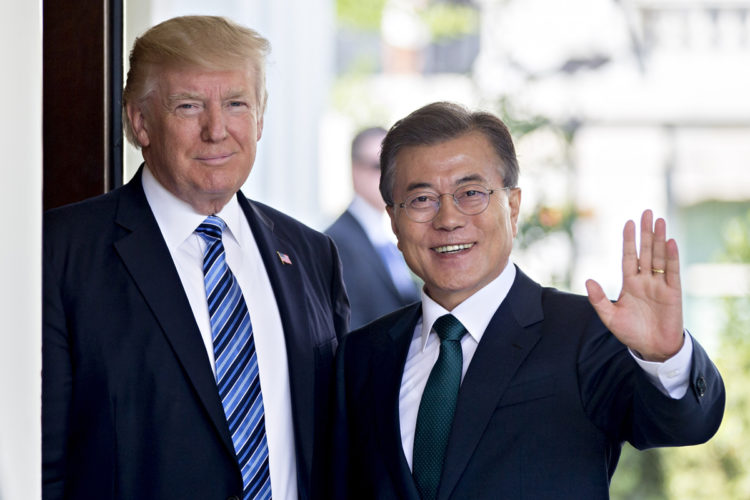Trump Demands `Fair Shake’ for U.S. Carmakers in South Korea

(Bloomberg) —South Korea must give U.S. automakers “a fair shake” to sell more cars there and stop exporting “dumped steel,” President Donald Trump told newly elected president Moon Jae-in during talks at the White House.
After meeting with Moon on Friday, Trump emphasized he’ll press for changes to the free-trade agreement between the U.S. and South Korea to reduce the U.S. trade deficit with the country. He told reporters he was encouraged by “Moon’s assurances that he will work to create a level playing field” for U.S. exporters.
Tensions with North Korea also figured prominently in the discussions as Trump signaled he would press for a tougher stance after the death of U.S. student Otto Warmbier following his detention in North Korea.
“The era of strategic patience with the North Korean regime has failed,” Trump said, “and frankly that patience is over.”
Moon said the two had “a candid and lengthy conversation” in which Trump “came across as a man of determination.” He said threats from North Korea would be met with a “stern response” and said North Korean leader Kim Jong-Un “should by no means underestimate the firm commitment” in the military alliance between the U.S. and South Korea. At the same time, he struck a somewhat softer tone in a speech later Friday, saying negotiations were possible with the North.
“Engaging in dialogue with Chairman Kim Jong Un is also necessary, for he’s the only one who can decide to dismantle North Korea’s nuclear weapons,” Moon told the Center for Strategic and International Studies in Washington.
The South Korean leader didn’t directly address Trump’s complaints about trade in his remarks at the White House or in his speech. But, Moon said, “Economic growth and job creation will be promoted to ensure our peoples enjoy greater mutual benefits through the collective efforts we committed to make.”
Trump’s pressure on South Korea over steel exports comes as the administration is considering whether to take broader action against foreign-made steel. The Commerce Department has been investigating whether imported steel threatens U.S. security under Section 232 of the Trade Expansion Act.
Commerce Secretary Wilbur Ross has been pushing to conclude that inquiry before the end of June, but a White House official said Friday that it’s unlikely to be. A finding that steel imports are a security risk could trigger action by Trump to impose tariffs, quotas, or a combination of the two.
Sore Point
U.S. automakers’ access to South Korea has been a sore point in trade relations for years. Former President Barack Obama renegotiated a free-trade agreement with South Korea struck by George W. Bush’s administration in part to gain better terms for U.S. automakers. Trump has said that he plans to either renegotiate or scrap the trade pact, known as Korus.
The U.S. ran a $27.6 billion trade deficit with South Korea in 2016, according to U.S. Census Bureau data. South Korea imported $1.6 billion in U.S. autos while exporting $16.1 billion in autos to the U.S. that year.
As a presidential candidate, Trump slammed the U.S. trade agreement with South Korea as a “job-killing” deal.
The meetings between Trump and Moon also provided a chance for the two leaders, who have sharply different ideas about how best to address the threat from North Korea’s nuclear and ballistic-missile tests, to reconcile their approaches.
“I think we have a very, very strong, solid plan,” Trump said in his second meeting of the morning with Moon, adding that concerns about North Korea had dominated a dinner he hosted for the South Korean president the previous night.
China Connection
The Trump administration, which has grown increasingly frustrated with provocations from Kim’s regime, announced Thursday it was imposing sanctions on a Chinese bank, a shipping company, and two Chinese citizens to pressure the regime. The penalties include prohibitions that will cut off the Bank of Dandong from the international finance system.
Trump has expressed disappointment that China hasn’t done more to pressure North Korea, which depends on China for most of its trade. The new sanctions came after the death of Warmbier, a U.S. college student detained and imprisoned in North Korea earlier this month.
But Moon, a former human-rights lawyer who took office last month, has slowed deployment of a U.S. missile shield in South Korea, as well as advocated increased dialogue with North Korea. An adviser suggested downsizing joint military exercises, and Moon has also pushed for symbolic gestures, including the possibility of North Korean participation in the 2018 Winter Olympics.
In the speech later Friday, Moon said the adviser was expressing a personal opinion and that the exercises wouldn’t be curtailed. He declined to elaborate on Trump’s “solid plan,” but said dialogue was possible if North Korea promises to stop its nuclear and missile provocations or if it releases three Americans still in its custody.



No Comment